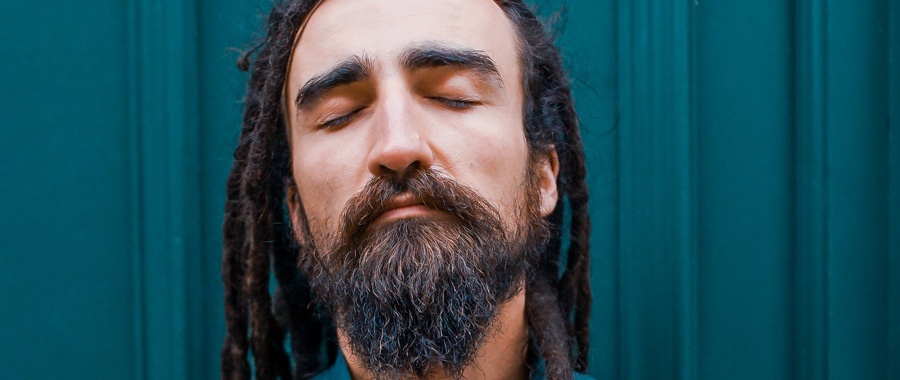The views expressed in our content reflect individual perspectives and do not represent the authoritative views of the Baha'i Faith.
A dear friend died last week. Because of the pandemic, there won’t be a funeral. I’ll have to pray and grieve at home. So I wonder: do those in the next world miss us the same way we miss them?
I think we’ve probably all pondered the same thing. When someone we love and care about leaves this physical plane of existence, we naturally feel the severe grief and pain of their sudden absence. It seems completely human to miss that person grievously, to experience the sorrowful anguish of loss, to brim over with tears, to sense a hole in reality which that friend or family member once filled.
One of the few species that actually grieves, we humans undergo the loss of friends and loved ones in deep and profound ways. Especially now, with the coronavirus killing so many people around the world, our collective grief has increased exponentially. We’re all connected within the fabric of human relations to someone who has passed on, and to the misery and mourning that accompanies their deaths. We miss them terribly.
But do they miss us when they’re gone?
The question intrigued me, so I decided to see what I could find out by going to the richest source for spiritual knowledge I know of, the Baha’i writings. Filled with intelligence, clarity, and deep insight, those extensive scriptures contain an enormous well of wisdom. Baha’u’llah, the founder of the Baha’i Faith, assured humanity that each of us will have an eternal existence beyond the limited lifespan of the physical body:
Thou hast asked Me whether man, as apart from the Prophets of God and His chosen ones, will retain, after his physical death, the self-same individuality, personality, consciousness, and understanding that characterize his life in this world.
Know thou that the soul of man is exalted above, and is independent of all infirmities of body or mind. … When it leaveth the body, however, it will evince such ascendancy, and reveal such influence as no force on earth can equal. Every pure, every refined and sanctified soul will be endowed with tremendous power, and shall rejoice with exceeding gladness.
Baha’is firmly believe in the immortality of the human soul, and the Baha’i teachings promise everyone an everlasting life. We’re each born from the womb of our mothers, and one day, in the same way, we will each experience birth from this realm of mother Earth into a new spiritual realm. Baha’u’llah wrote:
Know thou of a truth that the soul, after its separation from the body, will continue to progress until it attaineth the presence of God, in a state and condition which neither the revolution of ages and centuries, nor the changes and chances of this world, can alter. It will endure as long as the Kingdom of God, His sovereignty, His dominion and power will endure.
The condition of our souls and our level of consciousness in that new reality, the Baha’i teachings say, depends on our detachment from this physical world and our attachment to the eternal spiritual reality:
Blessed is the soul which, at the hour of its separation from the body, is sanctified from the vain imaginings of the peoples of the world. Such a soul liveth and moveth in accordance with the Will of its Creator, and entereth the all-highest Paradise.
We know very little about that next world, of course. Baha’u’llah wrote that “the nature of the soul after death can never be described …” and “The world beyond is as different from this world as this world is different from that of the child while still in the womb of its mother.”
The Baha’i teachings do clearly say, though, that the next world has no physical limitations — that it is unbounded by space or time. Abdu’l-Baha, the son of Baha’u’llah wrote:
The Kingdom is outwardly referred to as “heaven,” but this is an expression and likeness and not a factual statement or reality. For the Kingdom is not a material location but is sanctified above time and place. It is a spiritual realm, a divine world, and it is the seat of the sovereignty of the almighty Lord. It is exalted above bodies and all that is corporeal, and it is freed and sanctified from the idle conjectures of men. For to be confined to place is a characteristic of bodies and not of spirits: Time and place encompass the body, not the mind and the soul.
And in a talk in London Abdu’l-Baha explained:
In the next world, man will find himself freed from many of the disabilities under which he now suffers. Those who have passed on through death, have a sphere of their own. It is not removed from ours; their work, the work of the Kingdom, is ours; but it is sanctified from what we call ’time and place.’ Time with us is measured by the sun. When there is no more sunrise, and no more sunset, that kind of time does not exist for man.
Personally, I’ve really struggled — and continue to struggle — with this concept. I find it supremely difficult, even baffling, to imagine an existence without past or future, a timeless and placeless place. My house has a clock in every room, my cell phone continually displays digital hour and minute numbers on the screen, and I always wear a watch — so, like many Westerners, time plays a significant role in my life. In fact, I often feel like time’s prisoner, bound to a temporal reality I would dearly love to transcend. Perhaps that explains why a timeless existence seems so hard to comprehend. My mind tries very hard to wrap itself around such a concept but usually fails.

Today, modern physicists wrestle with the same dilemma. The old Newtonian physics treated time as an absolute, flowing ever-forward with mathematical regularity and without regard to anything external. But Einstein upended this view by proving that space-time forms an integral part of the fabric of the universe itself — which means that our clocks, watches, and cell phones do not and cannot measure anything absolute. Science calls this phenomenon time dilation. To illustrate: after six months on the International Space Station, which orbits Earth at a speed of about 18,000 miles per hour, an astronaut ages about 0.007 seconds less than those on Earth. Why? Because time is relative, not absolute.
In fact, quantum mechanics has conclusively proven that all particles of matter and energy, the building blocks of our universe, can also be described as waves. Contemporary physics recognizes that waves have an unusual property — an infinite number of them can potentially exist in the same location. Could this mean that time is an illusion? Might it indicate that time is only a physical construct and that beyond the physical every moment potentially exists at once? Several respected physicists have actually reached that conclusion.
When Einstein’s lifelong friend and mentor Michele Besso died, the great scientist mused about these same questions in a letter of consolation he wrote to Besso’s family:
Now he has departed from this strange world a little ahead of me. That means nothing. People like us, who believe in physics, know that the distinction between past, present, and future is only a stubbornly persistent illusion.
With me so far? If so, consider this: Those who have made their transition from this world to the next may have the ability to transcend time. Abdu’l-Baha put it this way:
… in the sight of God the past, the present and the future are all one and the same – whereas, relative to man, the past is gone and forgotten, the present is fleeting, and the future is within the realm of hope.
If the souls of those in the next world have no space-time restrictions, as the Baha’i teachings suggest, then could those souls easily move through the dimension we think of as time? Couldn’t those souls, then, immediately place themselves at any point in physical time here on Earth? Wouldn’t it seem possible that they could simply skip over the years of separation between their own deaths and the time when their loved ones also ascend to the spiritual world — as we all inevitably will?
Yes, I know — the idea boggles the mind. We’re so used to thinking in terms of time in the old linear way, even though the dimension we experience as time in this world emerged from and will return to a more fundamental, timeless reality.
Assuming the truth of all this leads me to one conclusion — those who have passed on to the next world may have no need for the same kind of grief we feel. They may not miss us in the same way we miss them, because inevitably, they understand that we will join them — in fact, that we already have.
















Comments
Sign in or create an account
Continue with Googleor